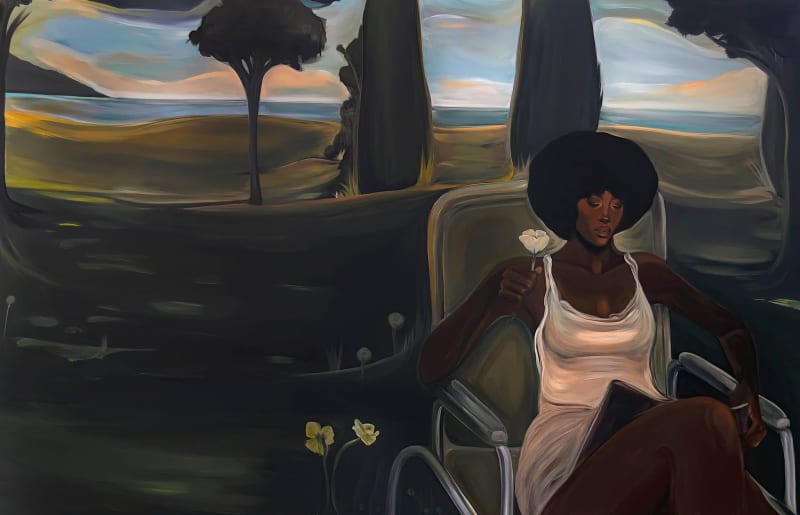Today in 2023, with the pandemic not long behind us, the legacy of its impact and effect has endured in how we now perceive the idea of how and where we live and work, our work-life balance, and how we value our time and the people we love.
The advocacy for slower living by the zoomer generation, international labour campaigns for a shorter working week, and the buoyancy of the travel and tourism industry, all serve as indications of a growing need and desire for more rest, leisure, nature and quality time with our loved ones. This is fast becoming the new social currency and benchmark for happiness and success.
What uniquely bonds the practices of Lulama Wolf and Megan Gabrielle Harris, despite their unique and distinct practices, is their base appreciation and longing for a time when simplicity and naturalism reigned supreme, and the complexes and rigidity of modern civilisation were not a consideration. Both artists seemingly ache for the pastoral, a time long forgotten in the wake of modernity, development, and ‘civilisation’, but one whose guiding principles and creed still govern a way and possibility of life and conviction that endures today in the 21st century.
‘Smell the Flowers While You Can’ is a rallying cry for society today to question and address today’s mode of living, and to challenge the accepted norms, practices, beliefs and values that have come to define our era and generation for the past century.
Megan Gabrielle Harris (b.1990) exemplifies this phenomenon of slow living and soft life perfectly, both in her afro-escapism and surrealism practice, and in her personal lived experience.
Hailing from Sacramento in Northern California, Megan’s works are loosely inspired by either her own personal travels, or places that she would love to, and aims to visit.
A kaleidoscope of soft, and loose pastel hues frames her dreamscapes, transporting viewers of her portraits into an enchanted realm of endless possibility and beauty. Her muses, tranquil and stunning as the idyllic settings they find themselves in, adorn light satin-silk dresses that flow as liberally as the distant lakes that they peacefully regard.
Across the entirety of her oeuvre, we are denied the chance to make direct eye contact with her muses. Their eyes are perpetually closed, or diverted from the gaze of the viewer, almost in an oblivious state of peace, harmony, and meditation, unperturbed and unaware of anyone or anything other than their moment of bliss.
In addition to celebrating the notion of rest, leisure and repose, Megan enjoys conveying pastoral themes and elements in her work, with most of her landscapes celebrating the beauty of nature in a very paradisiacal manner. True to her escapism practice and principles, the artist employs edenic features in her paintings as a means to communicate the sacredness and divinity of nature at its best, and indeed, as God had intended before the fall of man. It is in this utter state of unparalleled serenity and happiness, that Megan’s muses are able to be the heightened versions of themselves; feminine, fragile and free.
Lulama Wolf (b.1993) also explores the philosophy of humanism and naturalism as it pertains to the value attached to living a life of abundance, intimacy, and freedom, as well as the appreciation for the earth’s natural beauty and elements, which forms an integral part of her practice.
Based in Johannesburg, South Africa, a stone's throw away from the cradle of civilization, Lulama’s abstract neo-expressionist paintings are reminiscent of, and a homage to prehistoric rock art and cave paintings, marked by the act of smearing, human mark marking, and natural elements such as earth, rock and sand.
In Lulama’s own practice, she incorporates sand fused with acrylic paint to create the raised texture her canvases have come to be known for, creating an effective illusion of her paintings being fragments of an ancient cave wall. She contributes further to her practice of naturalism by her meticulous selection of the pigment of paint she uses; muted palettes of indigo blue, earth brown and forest green, create a serene and balanced terrain for her minimalist subjects to inhabit and exist, providing an insight into and perhaps even a longing for a simpler and less complex time and society.
Moreover, Lulama’s subjects, in their dark, abstracted, elongated and distorted forms, are elegant, refined, loose and objectively beautiful to behold. Whilst static in nature, the liberty of their expression and form creates a poetic motion which sweeps across the canvas, almost as if her figures are in a constant state of song and dance.
In paintings such as ‘Alumanda (Love Knows No Bounds)’, ‘Be your weight in gold’ and ‘What you long for’, Lulama contemplates ideals of both intimacy as it relates to platonic and romantic love, as well as the primal urge to love oneself before others, in the form of self worth, esteem and acceptance.
Raphael Dapaah
Art Consultant
Curator & Writer




